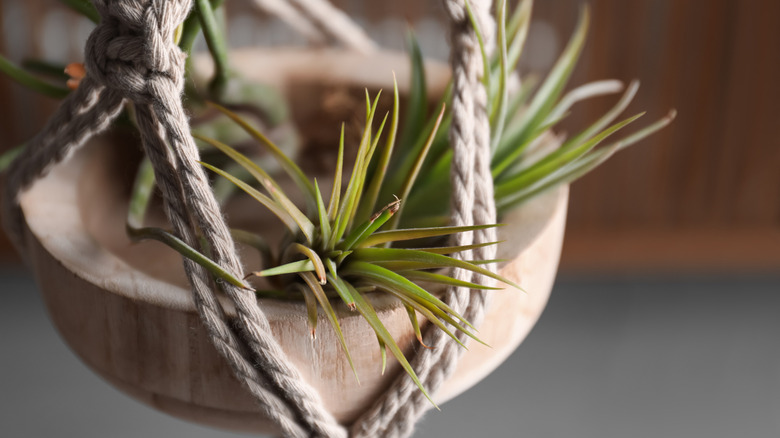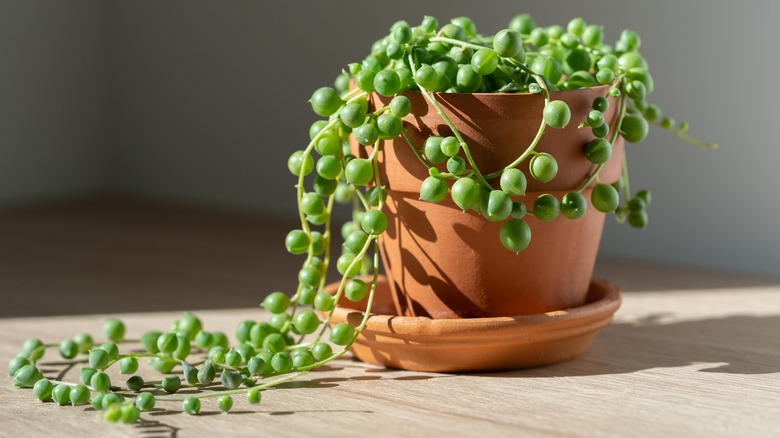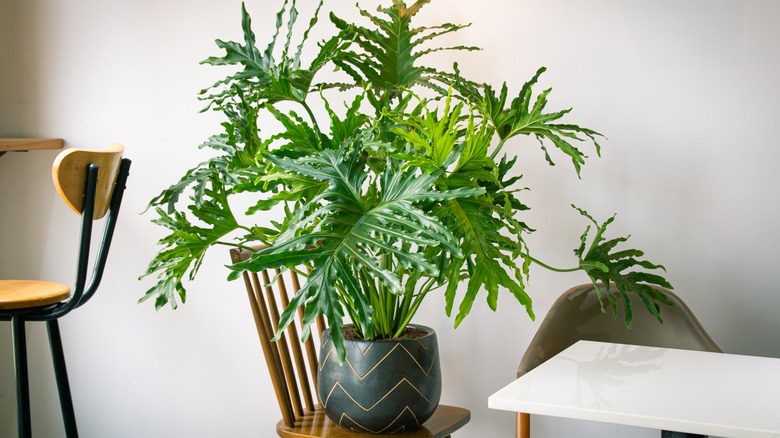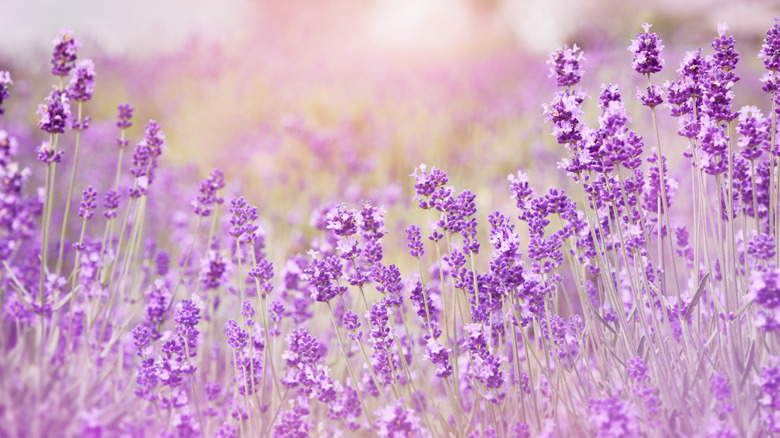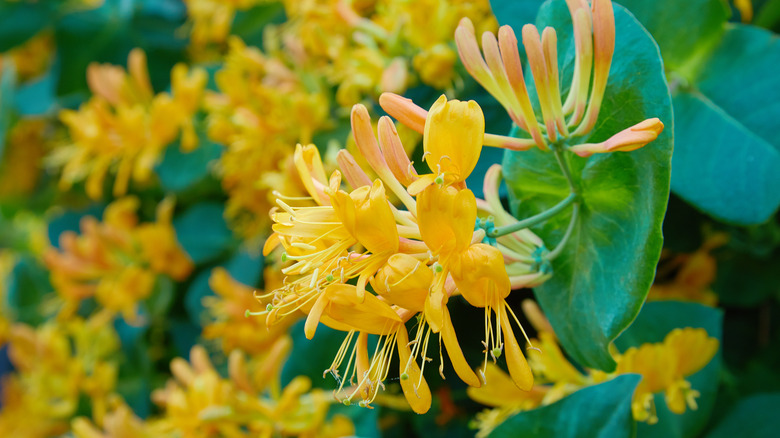The Best Plants To Include In Your Garden If You're A Gemini
If you were born between May 21 and June 20, you fall under the Gemini zodiac sign, which is the third youngest of the twelve signs, per Astrology Zodiac Signs. Gemini is an air sign, along with Libra and Aquarius, as well as a mutable sign, along with Virgo, Sagittarius, and Pisces. It is also ruled by Mercury, along with Virgo. Geminis are represented by the Twin image, usually depicted by two lines connected at the top and bottom.
Geminis are known to be very energetic, sociable people, as well as quick learners, easily adaptable to a variety of situations, and have a natural curiosity. They tend to have an interest in the arts or other creative, team-oriented fields, as well as being the life of the party. On the flip side, Geminis can be a little inconsistent and hard to pin down. If you're a Gemini looking to tailor your garden to your particular cosmic energy, you should consider getting plants that match your zodiac sign. There are a host of plants that can be grown both indoors and outdoors that can help resonate with and balance Gemini's unique energy.
Air plants
Being one of the three air signs, it is fitting that one of the first recommended plants for Geminis is an air plant, per Lifestyle Asia. More than just having an element in common, air plants are very easy to maintain and can be moved around as you see fit, very similar to the easy-going, adaptable nature of Gemini.
Air plants can be grown both indoors and outdoors. When grown indoors, you need to water the plant every week or so by submerging it in filtered or rainwater for roughly six hours, letting it dry completely before returning it to its terrarium or basket (via Airplantman). Each air plant has different light level requirements, but bright indirect light is a pretty safe bet. Lastly, as its name would suggest, air plants need access to moving, ideally fresh, air. Place it by a window you can open or by a fan, for instance.
When grown outdoors, be careful not to expose it to temperatures cooler than 40 degrees or hotter than 100 degrees. It will not hurt your plant to move it inside in colder months if you need to. The natural, fresh outdoor air will supply it with the necessary water, but mist at least once a week, more if you live in a dryer climate, recommends Beach Paradise Air Plants.
String of pearls
Next up on the list for plants with Gemini energy is a string of pearls plant. According to Lively Root, this plant matches the zodiac sign's vibes in that it is truly one of a kind, having a slightly hectic energy.
String of pearls plants can also be grown either indoors or outdoors, as long as you either live in a warmer climate or can bring it inside during cooler months. This succulent does well in temperatures ranging from 70 to 80 degrees from spring to fall and around 55 to 60 degrees in the winter (via Succulents Box). Regardless of where you grow them, make sure your string of pearls plant is receiving six to eight hours of bright but indirect light. Be very careful not to overwater this plant, as it can easily develop root rot and die. Outdoors, regular rainfall should be fine. Indoors, water when the top half inch of soil is completely dry, if not a little longer — underwatering is better than overwatering.
Philodendron
Philodendrons are also another plant that resonates with those born under a Gemini sun. As ProFlowers points out, philodendrons are quite adaptable to a variety of circumstances, which is very similar to their celestial counterpart. There are also multiple varieties of philodendron to choose from, making it just as variable as a Gemini.
As with most traditional houseplants, philodendrons should generally be kept inside except for warmer months, when you can bring them outside for the summer. Each philodendron will have roughly the same care needs, but know that each variety may have its own quirks. In general, though, this plant prefers bright and indirect sun, per Costa Farms. Philodendrons are also susceptible to root rot. They also can survive a little bit of watering neglect, so always err on the side of underwatering, only giving it a drink when the top inch of soil is dry. Some philodendrons vine and climb, so either offer them a trellis or place on a high ledge.
Lavender
For a more fragrant addition to your garden, Geminis should consider growing some lavender. Fresh Trimmings notes the similarities between the herbaceous flower and the zodiac sign. First, just like a Gemini, lavender is always a welcome, pleasant sight, greeting you with beautiful purple flowers and a sweet smell. Also, just like the multi-faceted Gemini, lavender is a multipurpose plant.
Lavender can also be grown outdoors or indoors in an herb garden. Lavender is a hardy perennial starting at USDA hardiness zone 5, so if you live somewhere cooler, you may want to plant it in a pot regardless (via Bonnie Plants). Lavender grows best when it's left to dry out between waterings, so only give it a drink when the top 2 inches of soil are completely dry. A water-soluble fertilizer will also help the plant grow larger and healthier. Lavender plants prefer lots of full, bright sun.
Honeysuckle
Gemini is ruled by the planet Mercury, which has everything to do with communication, awareness, and the application of knowledge, according to Astrology Zodiac Signs. This planet has a major influence over the zodiac sign and also has its own set of resonant plants. Ancient Astrology states that Mercurial plants include those that can easily adapt to the elements and have slightly inconsistent physical qualities. One of those plants includes honeysuckle.
Honeysuckles can grow either as a shrub or vine and produces a very sweet-smelling, nectar-filled yellow flower that attracts pollinators and is also safe for human consumption (via MasterClass). Honeysuckles are outdoor plants and will start to bloom in the spring. There are numerous varieties of honeysuckle, so check with your hardiness zone compatibility before jumping into caring for this plant. Honeysuckles prefer full sun and rich soil. If you have a vining honeysuckle, support it with a trellis or train the vines as it grows.

